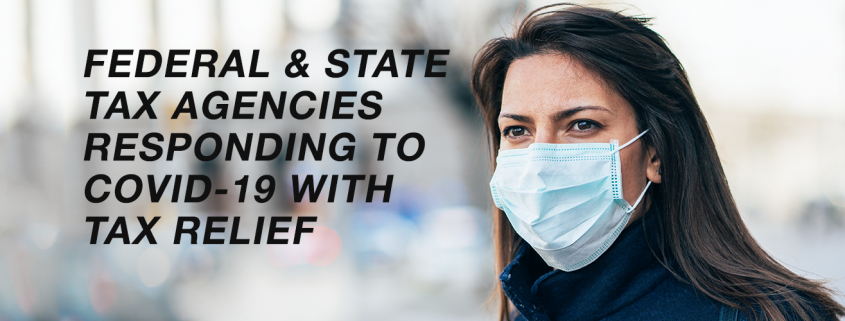Federal & State Tax Agencies Responding To COVID-19 With Tax Relief
Federal & State Tax Agencies Responding To COVID-19 With Tax Relief
IRS Coronavirus Tax Relief
The IRS has established a special section focused on steps to help taxpayers, businesses and others affected by the coronavirus and as information becomes available, the IRS will be updating this special page on its website.
President Donald Trump declared the coronavirus pandemic a national emergency. Therefore, under Sec. 7508A, the declaration of an emergency under the Robert T. Stafford Disaster Relief and Emergency Assistance Act, P.L. 100-707, the IRS is allowed to delay certain tax filing and payment deadlines.
Treasury Secretary Steve Mnuchin’s Announcement
On March 17, 2020 Treasury Secretary Steve Mnuchin announced a series of tax relief measures that he intends to push through that are designed to assist taxpayers and tax preparers during the COVID-19 pandemic. Mr. Mnuchin is seeking relief for individuals and corporations to permit the delay in making their tax payments for 90 days from the April 15 deadline. Individuals can defer up to $1 million in payments. Corporations can defer up to $10 million in payments. During that time, the IRS will not charge interest or penalties.
Mr. Mnuchin’s announcement does not delay the April 15th filing deadline. It affects 2019 federal income taxes only. Mr. Mnuchin did not address 2020 estimated tax payments, payroll taxes, or estate and gift taxes.
Formal guidance is still forthcoming and will be communicated in further blogs.
California Coronavirus Tax Relief
The California Franchise Tax Board (“FTB”) on March 13, 2020 announced special tax relief for California taxpayers affected by the COVID-19 pandemic. Affected taxpayers are granted an extension to file 2019 California tax returns and make certain payments until June 15, 2020, in line with Governor Newsom’s March 12 Executive Order.
“During this public health emergency, every Californian should be free to focus on their health and wellbeing,” said State Controller Betty T. Yee, who serves as chair of FTB. “Having extra time to file their taxes helps allows people to do this, as the experts work to control the spread of coronavirus.”
This relief includes moving the various tax filing and payment deadlines that occur on March 15, 2020, through June 15, 2020, to June 15, 2020. This includes:
- Partnerships and LLCs who are taxed as partnerships whose tax returns are due on March 15 now have a 90-day extension to file and pay by June 15.
- Individual filers whose tax returns are due on April 15 now have a 60-day extension to file and pay by June 15.
- Quarterly estimated tax payments due on April 15 now have a 60-day extension to pay by June 15.
The FTB’s June 15 extended due date may be pushed back even further if the Internal Revenue Service grants a longer relief period.
Taxpayers claiming the special COVID-19 relief should write the name of the state of emergency (for example, COVID-19) in black ink at the top of the tax return to alert FTB of the special extension period. If taxpayers are e-filing, they should follow the software instructions to enter disaster information.
The FTB will also waive interest and any late filing or late payment penalties that would otherwise apply.
Other States
The American Institute Of Certified Public Accounts has put out a comprehensive list of what tax relief is being offered at the State level.
An Opportunity For Taxpayers Who Owe The IRS
Do not think that if you owe the IRS your tax problem will disappear because of the measures being considered by the government. Instead you should be utilizing this valuable time to get yourself prepared so that when activity in this nation regains momentum, you are ready to make the best offer or proposal to take control of your outstanding tax debts.
As a prerequisite to any proposal to the IRS, you must be in current compliance. That means if you have any outstanding income tax returns, they must be completed and submitted to IRS.
Also, if you are required to make estimated tax payments, you must be current in making those payments. Fortunately, as we are now in 2020, taxpayers who expect to owe for 2019 should have their 2019 income tax returns done now so that the 2019 liability can be rolled over into any proposal and the requirement to make estimated tax payments will now start for 2020.
Remember that COVID-19 does not alter the tax laws, so all taxpayers should continue to meet their tax obligations as normal. Individuals and businesses should keep filing their tax returns and making payments and deposits with the IRS, as they are required to do.
The take away from this – use the Federal government’s downtime to your advantage to prepare for the future.
What Should You Do?
You know that at the Law Offices Of Jeffrey B. Kahn, P.C. we are always thinking of ways that our clients can save on taxes. If you are selected for an audit, stand up to the IRS by getting representation. Tax problems are usually a serious matter and must be handled appropriately so it’s important to that you’ve hired the best lawyer for your particular situation. The tax attorneys at the Law Offices Of Jeffrey B. Kahn, P.C. located in Orange County (Irvine), Metropolitan Los Angeles (Long Beach and Ontario) and elsewhere in California are highly skilled in handling tax matters and can effectively represent at all levels with the IRS and State Tax Agencies including criminal tax investigations and attempted prosecutions, undisclosed foreign bank accounts and other foreign assets, and unreported foreign income. Also if you are involved in cannabis, check out what a cannabis tax attorney can do for you. And if you are involved in crypto currency, check out what a bitcoin tax attorney can do for you.


 Follow
Follow Follow
Follow
